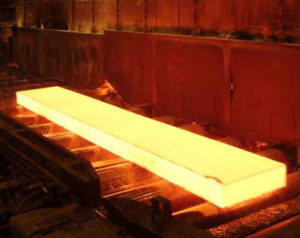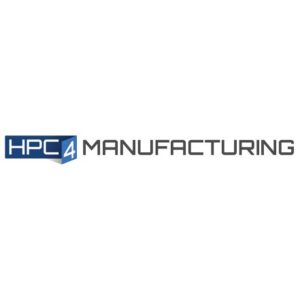
Under a newly awarded HPC4Manufacturing project, Lawrence Livermore National Laboratory will work with the U.S. Steel Corporation on a hot strip mill simulation model that will provide predictions of through-thickness temperature, deformation behavior and associated microstructure. Credit: Photo courtesy of U.S. Steel Corporation.
Today the HPC4Manufacturing Program announced four federal funding awards for solving key manufacturing challenges in steelmaking and aluminum production through supercomputing.
This most recent Call for Proposals had a special focus — applying the unparalleled HPC capabilities of DOE national labs to steelmaking and aluminum production processes. Under the program, each selected industry partner will have access to the national labs’ HPC machines and expertise to help these industries become more competitive, boost productivity and support American manufacturing jobs.
Primary metals industries are significant energy users, so opportunities to reduce energy consumption in this area is of great interest to our sponsors,” said HPC4Manufacturing Director Robin Miles of LLNL. “Additionally, this program is helping U.S. steel makers produce the higher strength steels vital to light weighting the next generation of automobiles.”
Funded by DOE’s Advanced Manufacturing Office, the HPC4Mfg Program is administered by Lawrence Livermore National Laboratory (LLNL) along with managing principal laboratories Lawrence Berkeley National Laboratory (LBNL) and Oak Ridge National Laboratory (ORNL).
The four projects receiving funding are:
- United States Steel Corporation (USS) will partner with LLNL in developing the expansion of the thermomechanical profile across a hot strip mill simulation model that provides predictions of through-thickness temperature, deformation behavior, and associated microstructure in a project titled “Hot Strip Mill Simulation Model”.
- AK Steel Corporation will partner with LLNL to improve real-time modeling of hot strip milling in a project titled “Application of HPC for Hot Rolling of Next Generation Steels”.
- ArcelorMittal USA, LLC will partner with LLNL to enable production of defeat free steel slabs with minimal trial and error in a project titled “Energy Efficient Manufacturing of Steel Slabs with the Application of High Performance Computing (HPC) and Machine Learning”.
- Alcoa USA Corporation will collaborate with ORNL to advance the performance of Alcoa’s new advanced smelting cell in a project titled “Optimization of Alumina and Aluminum Fluoride Feeding in Advanced Aluminum Smelting Cells Using Large Eddy Simulation”.
 DOE’s Advanced Manufacturing Office, within the Office of Energy Efficiency and Renewable Energy, is providing $300,000 for each project. Participating companies are required to contribute in-kind funds of at least 20 percent of DOE’s funding for the project. Each project is funded for one year.
DOE’s Advanced Manufacturing Office, within the Office of Energy Efficiency and Renewable Energy, is providing $300,000 for each project. Participating companies are required to contribute in-kind funds of at least 20 percent of DOE’s funding for the project. Each project is funded for one year.
To date, the HPC4Mfg program has granted nearly $20 million for 64 projects. Recent projects include efforts to improve the manufacturing of solid-state lithium-ion batteries, increasing the efficiency of gas turbine combustors, optimizing laser-based metal 3D printing platforms, improving energy efficiency and reducing waste during the papermaking process and reducing emissions in diesel engines.




